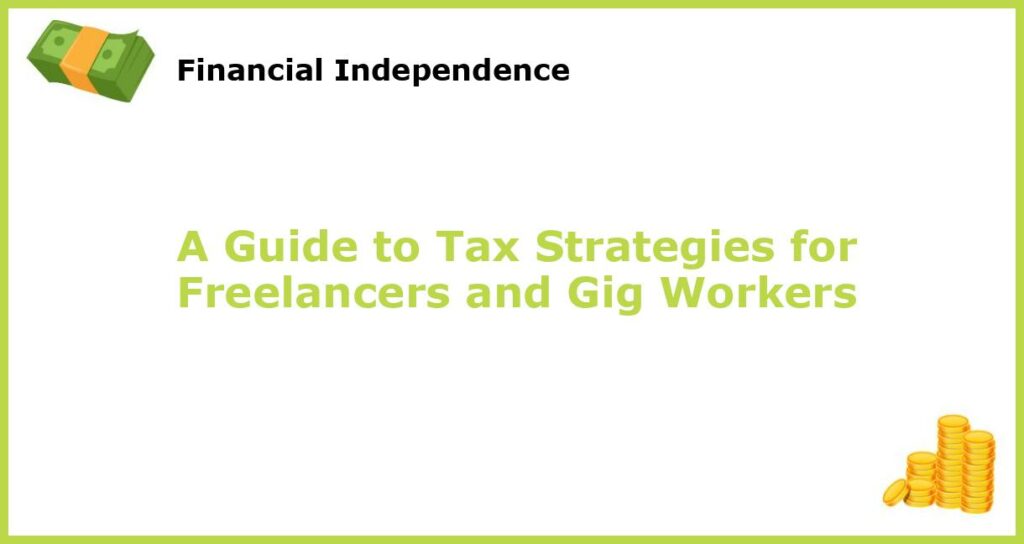Freelancers and gig workers often have the freedom to create their own schedules, choose their projects, and work from anywhere. However, they also bear the responsibility of managing their own finances and taxes. This can be a daunting task, but by understanding various tax strategies, freelancers and gig workers can minimize their tax liability and maximize their savings.
Make the most of deductions

When it comes to minimizing your tax liability, one of the most effective strategies is to take advantage of deductions. As a freelancer or gig worker, you likely work from home or rent an office – these spaces can qualify as business expenses, and you can deduct a portion of their costs on your taxes. Additionally, any supplies you purchase for your work, like a new computer or printer, are also deductible. However, be sure to keep clear records and only deduct expenses directly related to your work.
Understand the difference between W2 and 1099

When it comes to taxes, understanding the difference between W2 and 1099 classifications is crucial. As a freelancer or gig worker, you are often classified as self-employed and receive 1099 forms from your clients. This means that you are responsible for paying both the employee and employer portions of Social Security and Medicare taxes, also known as self-employment tax. Understanding these differences can help you plan for what you owe in taxes and avoid any unpleasant surprises come tax season.
Track your expenses

Keeping track of your business-related expenses throughout the year is essential in maximizing your deductions at tax time. Make sure you keep all of your receipts and invoices related to your business, and record them regularly. You can use accounting software, spreadsheets, or even a simple notebook to track your expenses. By doing so, you can ensure that you don’t miss out on any deductions.
Consider forming a business entity

Depending on the nature of your work, forming a business entity like an LLC or S corporation may provide additional tax benefits. Doing so can help shield personal assets from business liabilities and reduce your self-employment tax obligations. It’s important to consult with a tax professional before deciding to form a business entity, as the specific rules and regulations can vary by state and industry.
Don’t forget about retirement contributions

As a freelancer or gig worker, you don’t have an employer to plan and contribute to your retirement for you. However, you can still make contributions to a traditional IRA, Roth IRA, or solo 401(k) plan to benefit from tax-deferred savings. By doing so, you not only save for your future but also reduce your taxable income.
Use a tax professional if necessary
While tackling your taxes on your own may seem appealing, it’s important to bear in mind that tax rules and regulations can be complicated. If you’re unsure about how to handle your taxes, it’s best to seek the guidance of a tax professional. They can help you navigate the complexities of self-employment taxes and identify strategies to minimize your tax liability.
Be aware of estimated tax payments
As a freelancer or gig worker, you are responsible for making estimated tax payments each quarter to avoid penalties and interest. These payments are based on your projected earnings for the year and are due in April, June, September, and January of the following year. It’s important to plan ahead and set aside enough money to pay these taxes in a timely manner to avoid any additional fees.
Maximize your deductible travel expenses
If your work requires you to travel, even if it’s just to meet with clients or attend industry conferences, you may be able to deduct related expenses on your taxes. This includes airfare, lodging, and meals, as well as car rentals or mileage if you drive to your destination. Keeping track of these expenses can help you maximize your deductions and lower your taxable income.
Keep track of your time spent working
Tracking your time spent on each project can be helpful in determining your billable hours and what you can write off as business expenses. Keeping accurate time logs can also provide valuable insight into how you’re using your time, which can help you identify areas for improvement or opportunities to take on additional work. By doing so, you can ensure that you’re billing your clients accurately and maximizing your income and deductions.
Stay organized throughout the year
Finally, one of the most effective ways to minimize your tax liability is to stay organized throughout the year. Keep all of your invoices, receipts, and other financial documents in one place, and reconcile your accounts on a regular basis. This will help ensure that you’re ready to file your taxes and can maximize your deductions when tax time rolls around.







